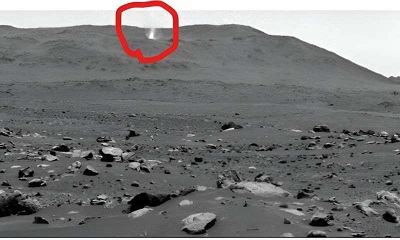Washington, (Asian independent) NASA’s Perseverance rover has spotted a dust-filled whirlwind on Mars.
Dust devils, which occur on Earth as well, form when rising cells of warm air mix with descending columns of cooler air. The Martian versions can grow to be much larger than those found on Earth.
The lower portion of a Martian dust devil was captured moving along the western rim of Mars’ Jezero Crater by NASA’s Perseverance rover on August 30, the 899th Martian day, or sol, of the mission, according to team officials.
The video, which was sped up 20 times, is composed of 21 frames taken four seconds apart by one of the rover’s Navcams.
“We don’t see the top of the dust devil, but the shadow it throws gives us a good indication of its height,” said Mark Lemmon, a planetary scientist at the Space Science Institute in Boulder, Colorado, and a member of the Perseverance science team, in a statement.
“Most are vertical columns. If this dust devil were configured that way, its shadow would indicate it is about 1.2 miles (2 kilometres) in height,” Lemmon added.
Using data from the imagery, mission scientists determined that the dust devil was about 4 kilometres away, at a location nicknamed “Thorofare Ridge,” and moving east to west at a clip of about 19 kph.
They calculated its width to be about 60 metres. While only the bottom 118 metres of the swirling vortex are visible in the camera frame, scientists used the dust devil’s shadow to estimate its full height at about 2 kilometres.
While Martian dust devils are most prominent during the spring and summer months (Mars’ northern hemisphere, where Perseverance is located, is currently in summer), scientists can’t predict when they’ll appear at a specific location.
So Perseverance and its fellow NASA Mars rover Curiosity routinely monitor in all directions for them, taking images in black-and-white to reduce the amount of data sent to Earth.
The six-wheeled Perseverance landed on the floor of the 45 kilometres wide Jezero Crater in February 2021. A key objective for Perseverance’s mission on Mars is astrobiology, including the search for signs of ancient microbial life.








